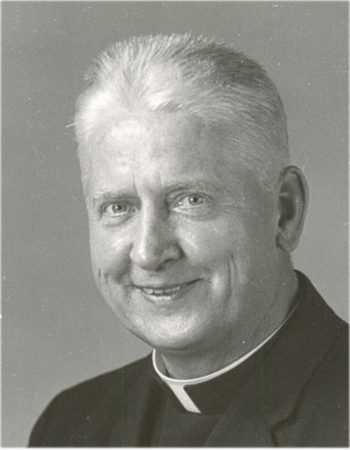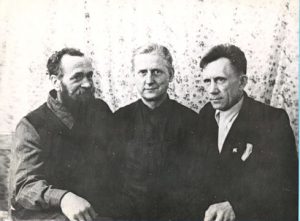
Servant of God Walter Ciszek was a missionary priest, political prisoner, professor, retreat master, author, and spiritual director. Walter was born in 1904 in the small coal-mining town of Shenandoah, Pennsylvania. His parents, Martin and Mika Ciszek, were hard working, poor Polish immigrants.
Tough guy from the start
From early childhood, Walter had a stubborn, aggressive streak. No amount of discipline worked to prevent him as a youth from taking part in gang activity, picking fights, or skipping school. Martin even took him to the local police station, requesting reform school. To the shock of his family, Walter announced during his teen years that he intended to become a priest. He went to a junior seminary in Michigan, where he continued to prove his toughness to others and to himself, disciplining himself by severe fasts and by swimming in icy water. By 1927, and having advanced part way through major seminary, Walter read a biography of St. Stanislaus Kostka. Kostka was a tenacious Polish teen who had walked from Warsaw to Rome to join the Jesuits. This story inspired Walter to challenge himself again, this time to the obedience for which the Jesuit order is known. Without informing anyone, he arrived at the Jesuit house in Bronx, New York.
Called to restore the faith in Russia
In the fall of 1928, he entered the Jesuit novitiate, and within a year volunteered to be sent to Russia. The situation there after the 1916 Bolshevik Revolution was dire, with Christianity almost obliterated under the Communist regime. Hundreds of thousands of priests and religious were wiped out, causing Pope Pius XI to request missionaries to help the abandoned laity. Walter finished his novitiate and studies in Rome at the Pontifical Russian College, where he learned the Russian language, culture, and liturgy. In the spring of 1937, he was ordained in the Byzantine rite. Since it was not possible for a priest to enter Russia, Fr. Ciszek was sent to Albertyn, Poland, where he spent two years teaching ethics at a mission seminary. 1939 was a horrendous year in Poland, with the Nazis and Soviets swallowing up the entire country. In September of 1939, Father’s students were sent home, and the mission was raided and closed. Fr. Ciszek and a friend went to Lviv in western Ukraine, where he worked for a time as a truck driver.
Still wanting to enter Russia and work as a missionary, Fr. Ciszek made a plan to cross the border blended in with the multitudes entering Russia for wartime factory jobs. With two Jesuit companions, he obtained the permission of his Jesuit superior and the Ukrainian Archbishop. With a fake ID and name, he crossed the border in March of 1940 in a boxcar, arriving at Chusovoy in the Ural Mountains. Life in a logging camp was difficult in many ways: the work was exhausting and low-paying. Out of fear of Communist informers, his fellow workers resisted all of his efforts at offering the Sacraments or even hearing of God’s existence. Out of fear that his Mass kit would be confiscated, he memorized the Mass prayers.
Recognition of the need for surrender to Divine Providence
In June of 1941, the Stalinist secret police raided his barracks, and he was arrested. He was transported to the notorious Lubianka prison in Moscow. His years of self-discipline made him confident that he could withstand the interrogations, but the Russians were ruthless. He was subjected to sleep deprivation, drug injections, and numerous ongoing mental and physical tortures. After a year of this, he signed a forced confession to being a Vatican spy. He was convicted and sentenced to fifteen years of hard labor at a gulag in Siberia. He later described the day he signed the confession as his darkest day, yet it was one that forced him to recognize his own utter dependence on God and it brought about a spiritual conversion. He ended up spending five years at Lubianka. After the conviction, the interrogations continued but the tortures ceased and he was at least allowed to read.

In 1946, Father was banished to a gulag in Norilsk, Siberia, north of the Arctic Circle, where it was extremely cold. His work was to shovel coal for twelve hours per day, most of the time with inadequate clothing, rags for shoes, and very meager rations. It is believed that well over a million men died there from starvation, exhaustion, and exposure. Father was imprisoned with a variety of army deserters, political prisoners and criminals. Using what crude supplies were available, he was able to offer clandestine Masses, hear confessions disguised as everyday conversations, and even offer secret retreats. In the spring of 1955, his sentence fulfilled, he was freed from captivity, but he had no means to leave Norilsk. There he worked three years in a factory, continuing his active ministry to people grateful for the spiritual nourishment. He obtained permission to write to his family, who were astounded to discover that he was still alive. When his ministry was discovered, he was banished from Norilsk and sent to Krasnoyarsk, where he built up a thriving parish and several missions. Again banished by the KGB in 1959, he worked four years as an auto mechanic at Abakan in south central Russia.
Return to America
In October of 1963, Father was taken by the KGB to Moscow, where he was turned over to the American embassy and returned to the USA. He spent the last twenty years of his life at Fordham University, where he counseled, wrote, and gave retreats and witness talks. He also founded a Byzantine Carmelite monastery. He died on December 8, 1984 and was buried at Wernersville, Pennsylvania.
When Walter Ciszek recognized his complete dependence on God after signing a fake confession under duress, he was a changed man. That dependence on God was his strength even in appallingly harsh, lonely, and repressive living conditions. He accepted it all as God’s perfect will for him at that time. Even when it was very dangerous to do so, he continuously remained faithful to his prayers, offered worship, and provided sacramental sustenance to those around him. In 1990 the Diocese of Allentown, Pennsylvania, in partnership with the Byzantine Catholic Eparchy of Passaic began the official process for promoting the cause for the canonization of Fr. Ciszek. Because the cause is open and active, he is currently known by the title Servant of God. Father’s two books, With God in Russia and He Leadeth Me are twentieth century spiritual classics, still in print decades after being written. There is a room set aside in his memory at Fordham which contains some of his personal belongings and his written final vows.
